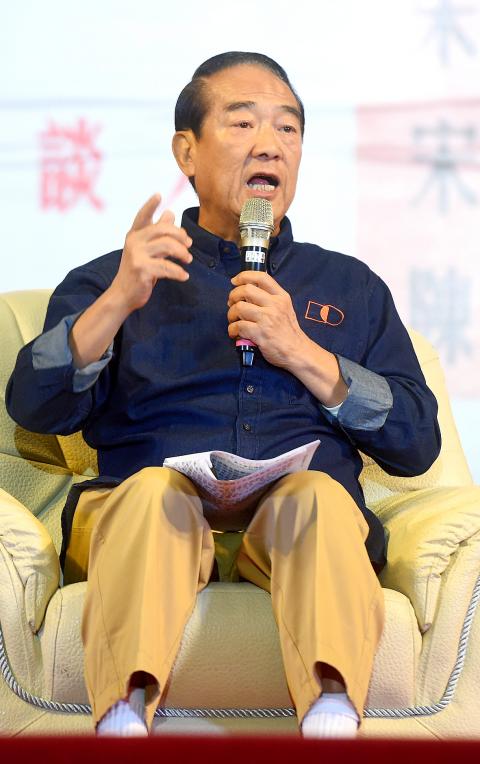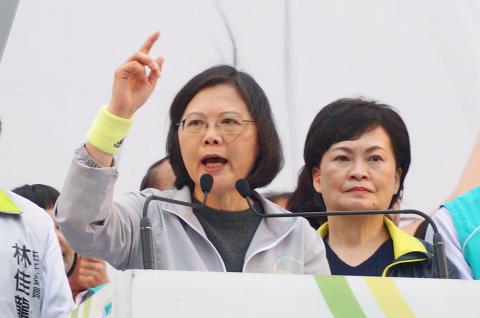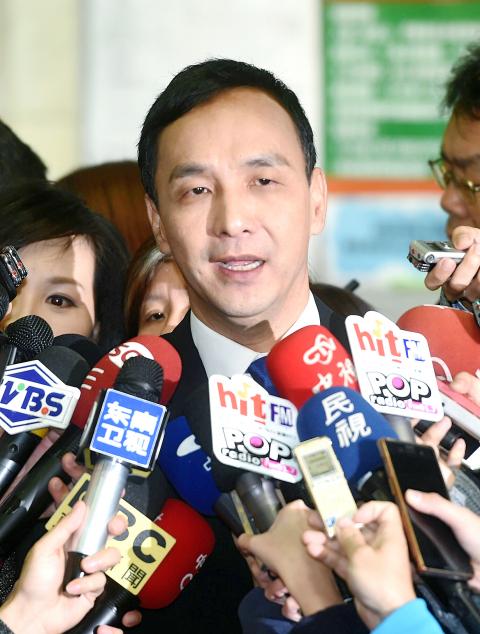Earlier this month, former vice premier Chiou I-jen (邱義仁) said the current election was “boring” in the sense that neither side was willing to “innovate.” Joey Neihu won’t hear a word of it.
Boring? Hell, no. This was the month, after all, that the woman formerly known as the Chinese Nationalist Party (KMT) presidential candidate wrote a book about how she made it as far as three months into the campaign before being ousted (she has promised her next work will be a blow-by-blow account of how she once decided to holiday in the Maldives, but later decided the better of it) and we … wait for it … finally got a round of vice-presidential and presidential debates.
KMT vice presidential hopeful Jennifer Wang (王如玄) was finally persuaded to stop playing Monopoly with her hapless husband, who stood down from his position as director of the Judicial Yuan Department of Government Ethics because it was, frankly, getting embarrassing, and People First Party presidential candidate James Soong (宋楚瑜) — did you see him kiss his knees when he took a podium bow? NEVER seen that in a 70-year-old — slipped some truth serum into the other candidates’ glasses as he sauntered past their debate podiums on the way to his own. Now that’s innovation for you.

Photo: Jian Rong-feng, Taipei Times
It took some inspiration from other quarters, however, with all parties at the beginning of the month still trying to reach a consensus on when to hold a coordination meeting in order to reach a consensus on when to hold the debate. No wonder they haven’t been able to reach a consensus on just about anything since, I don’t know, the very beginnings of a two-party system in Taiwan, when the KMT finally acquiesced to the idea of letting somebody other than itself get involved in forming a consensus of any sort. That’s close to 30 years, for those not in the know.
In the end, it fell to 40 student associations nationwide to organize a debate, on Sunday Dec. 6, between Soong, KMT presidential candidate Eric Chu (朱立倫) and Democratic Progressive Party (DPP) vice presidential candidate Chen Chien-jen (陳建仁). In case you were wondering, DPP presidential candidate Tsai Ing-wen (蔡英文) had asked for permission to be excused as she was going door-to-door asking if anyone had any spare piggy banks going (the party’s a bit broke). If the last two years have taught us anything, it’s that if you want anything done in politics in Taiwan, leave it to the students.
Finally, the presidential debate a few days ago, with Soong, Chu and Tsai lined up before the media. Someone asks Soong about legislative reform. He answers admirably, pointing out that his hands are tied, not having enough influence over the two major parties.

Photo: Tu Ju-min, Taipei Times
The question then goes to the obsequiously smiley Chu. “The KMT is committed to legislative efficiency and transparency in cross-party negotiations and a neutral legislative speaker,” he says, before taking a sip of water.
“Actually,” he adds, “we did promise legislative reforms, but only two months before the election, after we’ve had control of the legislature for the best part of 65 years, ‘cos we know we don’t have a chance in hell of winning this time round. And haven’t we just reformed the law so that one of our own can extend his term as legislative speaker?”
The next questioner, astounded at Chu’s honesty, aims their question at him, too. “Can you tell us how you are to address stagnant salaries?”

Photo: Wang Min, Taipei Times
“Certainly. I promise, if elected president, to raise the basic salary to NT$30,000 in my first term.”
“Didn’t the last one promise the same thing eight years ago, and fail miserably?”
Chu takes another sip from his glass. “Certainly. And I promise, if elected president, to fail, too. But it hardly matters, because all I’m required to do here is test the public’s credulity to a point just shy of breaking point.”
“Interesting. Tsai. Can I have your views on the salary issue?”
“Yes, of course.” Takes a sip of water. “Hold on… wait a mo… it’s on the tip of my tongue…. No, it’s gone.”
Soong then chimes in with an oratorically punctual, beautifully prepared and stringent clamor of policy ingenuity that all but the most informed or discerning are persuaded to believe, at least arguably, is absolute brilliance, despite the fact of it being crap.
Finally, a question for Chu. “Is the KMT going to return its ill-gotten party assets?
Chu drains his glass. “Not on your nellie, sister.”
Soong wins the debate.
Only some of the above is true.

In the March 9 edition of the Taipei Times a piece by Ninon Godefroy ran with the headine “The quiet, gentle rhythm of Taiwan.” It started with the line “Taiwan is a small, humble place. There is no Eiffel Tower, no pyramids — no singular attraction that draws the world’s attention.” I laughed out loud at that. This was out of no disrespect for the author or the piece, which made some interesting analogies and good points about how both Din Tai Fung’s and Taiwan Semiconductor Manufacturing Co’s (TSMC, 台積電) meticulous attention to detail and quality are not quite up to

April 21 to April 27 Hsieh Er’s (謝娥) political fortunes were rising fast after she got out of jail and joined the Chinese Nationalist Party (KMT) in December 1945. Not only did she hold key positions in various committees, she was elected the only woman on the Taipei City Council and headed to Nanjing in 1946 as the sole Taiwanese female representative to the National Constituent Assembly. With the support of first lady Soong May-ling (宋美齡), she started the Taipei Women’s Association and Taiwan Provincial Women’s Association, where she

Chinese Nationalist Party (KMT) Chairman Eric Chu (朱立倫) hatched a bold plan to charge forward and seize the initiative when he held a protest in front of the Taipei City Prosecutors’ Office. Though risky, because illegal, its success would help tackle at least six problems facing both himself and the KMT. What he did not see coming was Taipei Mayor Chiang Wan-an (將萬安) tripping him up out of the gate. In spite of Chu being the most consequential and successful KMT chairman since the early 2010s — arguably saving the party from financial ruin and restoring its electoral viability —

It is one of the more remarkable facts of Taiwan history that it was never occupied or claimed by any of the numerous kingdoms of southern China — Han or otherwise — that lay just across the water from it. None of their brilliant ministers ever discovered that Taiwan was a “core interest” of the state whose annexation was “inevitable.” As Paul Kua notes in an excellent monograph laying out how the Portuguese gave Taiwan the name “Formosa,” the first Europeans to express an interest in occupying Taiwan were the Spanish. Tonio Andrade in his seminal work, How Taiwan Became Chinese,